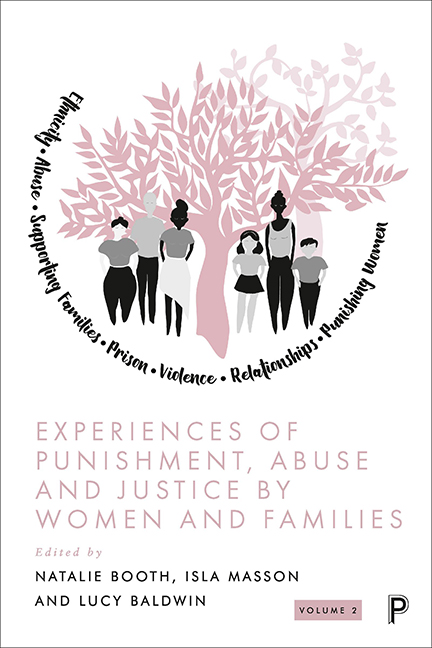Book contents
- Frontmatter
- Contents
- Notes on contributors
- Acknowledgements
- Foreword: time to shift the focus and reduce the use of the penal system for women
- 1 Keeping the conversation going: the Women, Family, Crime and Justice network
- Part I Punishing women in the criminal justice system
- Part II Violence, abuse and justice
- Index
5 - Recognising and responding to domestic violence and abuse in LGB and/or T+ people’s relationships: towards a ‘relationships services’ approach
Published online by Cambridge University Press: 18 January 2024
- Frontmatter
- Contents
- Notes on contributors
- Acknowledgements
- Foreword: time to shift the focus and reduce the use of the penal system for women
- 1 Keeping the conversation going: the Women, Family, Crime and Justice network
- Part I Punishing women in the criminal justice system
- Part II Violence, abuse and justice
- Index
Summary
Introduction
The last two decades have seen significant changes across the UK and internationally in the visibility, social acceptability and legal recognition of lesbian, gay, bisexual and/or transgender (LGB and/or T+) people’s relationships and families (Weeks, 2007). Significant milestones have included the expansion of equality legislation concerning sexuality and gender reassignment, the criminalisation of hate crime motivated by sexual orientation or transgender identity and legalisation of same-sex marriage in all nations of the UK (Stonewall, 2021). Legal change does not necessarily bring social and cultural change; however, the British Social Attitudes Survey, 2018 found that 66 per cent of the 2,884 people surveyed said that same-sex relationships were ‘not wrong at all’ compared with just 11 per cent in 1987 (Curtice et al, 2019). The benefits of these changes are, however, unevenly distributed, with LGB and/or T+ working-class people (McDermott, 2011) and people of colour (Stonewall, 2018) remaining marginalised both within and outside of LGB and/or T+ spaces.
This wider affirmation of the validity and integrity of LGB and/or T+ people’s intimate relationships coincides with growing evidence of domestic violence and abuse (DVA) among LGB and/or T+ people (Renzetti, 1992; Ristock, 2002; Finneran and Stephenson, 2013; Donovan and Hester, 2014, 2010; Badenes-Ribera et al, 2016; Donovan and Barnes, 2020a; Rogers, 2021). Estimates of the prevalence of DVA among LGB and/or T+ populations have primarily been based on non-random, self-selected survey samples. This has resulted in very variable and high estimates of DVA victimisation, ranging from 9.6 to 51.5 per cent for women (Badenes-Ribera et al, 2016) and 29.7 to 78.0 per cent for men (Finneran and Stephenson, 2013). Bisexual, transgender and non-binary people have often been excluded. More recently, the inclusion of sexuality (but rarely gender identity) questions in national, random surveys of DVA have enabled more comparable estimates with heterosexual people to be calculated. Analysis of Crime Survey for England and Wales data has found that bisexual women are almost twice as likely (10.9 per cent) to report having experienced DVA in the last 12 months, compared with 6 per cent of heterosexual women, and 8 per cent of gay/lesbian women (ONS, 2018; see also Messinger, 2011 for comparable differences in the United States).
- Type
- Chapter
- Information
- Experiences of Punishment, Abuse and Justice by Women and FamiliesVolume 2, pp. 71 - 90Publisher: Bristol University PressPrint publication year: 2023



